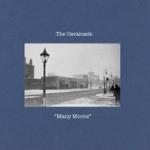
The Cavalcade Many Moons
(Pebble Records)
Since it’s inception in the early eighties, indie pop has become a taboo of sorts, unabashed about becoming a parody of itself since the Postcard Records era introduced the genre. In other words, when there was still doubt about what it really meant to sound both indie and pop at the same time. But does it matter to the artists themselves? For current generations, indie pop’s lush melodies and repeated chorus structures have endured through countless generations, proving to be the essential vitamin for sad-sacked love episodes and venting trivialities after countless hours of drunken chatter. It even comes with a warning label: “Misuse may cause injury to your broken heart”.
Indie pop has even become a subterranean commodity of choice. In fact, current labels like Pebble Records have based their business exclusively on supplying this particular genre's emblematic, sugary sound in all shapes and forms before record collecting became such a marketable beast. A node to defunct label Sarah Records and early Flying Nun recordings, Preston, UK’s The Cavalcade are intent on replicating indie pop’s core, blissful moments whilst footing their own print in the sand. Though the young band forms part of a systematic formula, main songwriters Craig Phillips and Stephen Birtchnell break the mold by actually being very adept songwriters, which breaks the old rule that playing indie (or twee for that matter) should work without knowing your instruments too well. Most of the arrangements that make up a Cavalcade song feature jangling guitars and strumming mid-tempo chords that associate to those who liken a bit of spark to their constant, dancing tempos.
Many Moons effectively starts prognosticating light showers, which proves that these guys are inspired by their ambient surroundings. Hell, even a quick glimpse of the album cover cries nostalgia; a sensorial image of an empty road amidst a dreary cold evokes a very naturalistic (and very English) sensibility that could serve as the background to one of William Wordsworth’s lyrical poems. That, or they are paying very close attention to The Clientele’s forms of transfixing music into a narrative medium.
Though ambient leanings may inspire them, The Cavalcade doesn’t have any interest in philosophizing over rainy days or five-day mornings. Instead of using rationale to express their stories, the songwriting is purely borne from an irrational, emotional state of mind. In kiwi-pop inspired Nobody’s Child, some orchestral elements fuse together with Birtchnell’s progressing arpeggios as Phillips’ blatantly gentle voice questions do you remember when we had it all, over a pondering chorus about how he lost his love again. Phillips’ simplistic and direct sorrows do hold a very twee approach; he’s very uninhibited about delving his heart with dramatic thoughts, phrasing clichés with childlike earnestness. Be warned: If you give Phillips a flower, he may very well start plucking each and every flower petal until he chooses his fate with his object of affection.
Many Moons’ charming production touches rightfully mesh with an astounding inventory of hooks. Regardless of the moribund rhythm section, at least the overall sameness leaves room to fully embrace some promising guitar work, thus, displaying an unexpected sense of variety to the songs. Birtchnell’s dynamic squalls in single-worthy I’m Like a Ship Trapped Inside a Bottle perfectly complement the lackadaisical strums with some faint - and very charming - keyboard effects that bear a resemblance to a heart beating. And while We Always Move too Slow makes a strong case in raising Britpop to an epic scale, Your Old Room’s brooding reverb establishes Many Moon’s second half with a convivial tranquility. Meanwhile, For You’s Theremin-inspired effects grant some distinctiveness, leaving enough open spaces for Birtchnell to fill some layered Johnny Marr-isms – all this euphoria in a three-minute time lapse.
Despite all these pleasant touches, Many Moons doesn’t achieve enough variety to distinguish the Cavalcade from being just another number in Pebble’s long catalogue of comparable hopefuls. What they do achieve is carrying out a solid collection of impeccably arranged songs that blend almost faultlessly. In contrast to the usual, run-of the-mill indie pop artists, The Cavalcade provides enough authentic moments to counterweigh those snugly held influences. Once they decide to break free from the inevitable genre staples, they’ll move one step closer towards what could be a very special career.
12 August, 2010 - 06:54 — Juan Edgardo Rodriguez